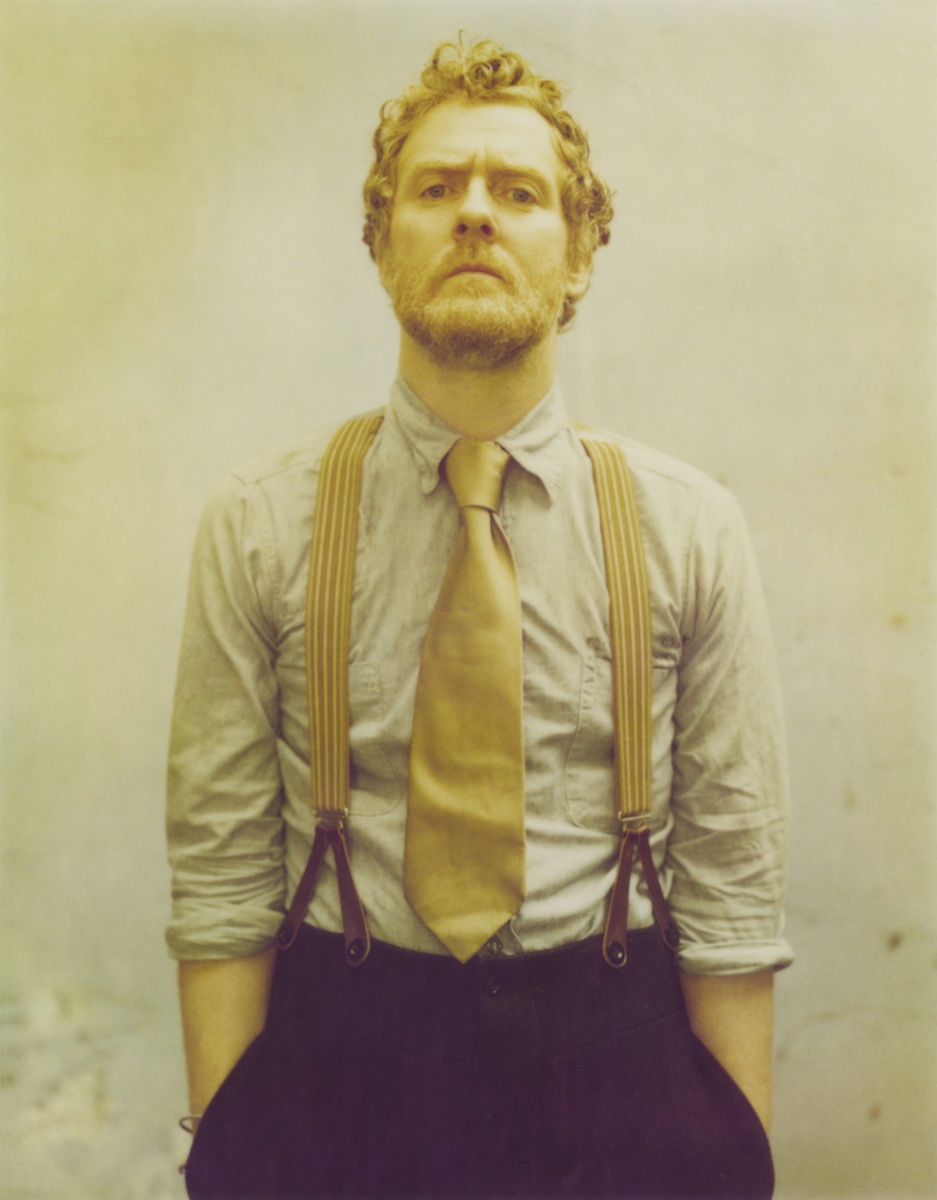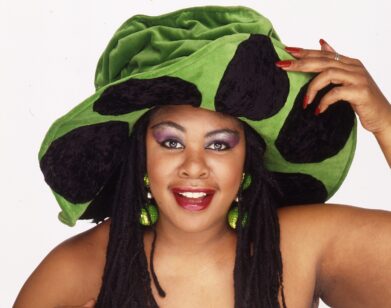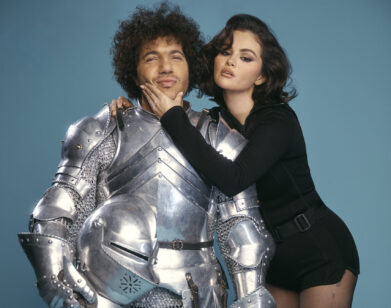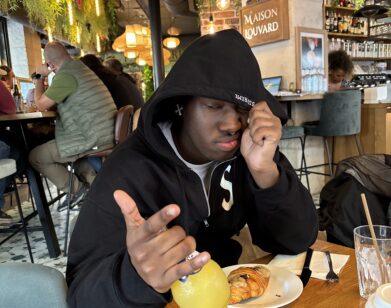Glen Hansard, Once and Again

ABOVE: GLEN HANSARD. IMAGE COURTESY OF CONOR MASTERSON
To say Glen Hansard is having a good month would be an understatement. The Irish troubadour, whose first solo record, Rhythm and Repose, drops tomorrow, has just seen his little musical that could, Once, blossom from an indie film with limited distribution into a full-blown Broadway production that took home eight trophies at last Sunday’s Tony Awards. Even for Hansard, the humblest of interview subjects who began his career busking on the streets of Dublin nearly thirty years ago, this is just cause for reflection—if not self-congratulation.
But there is much more to Glen Hansard than this latest triumph. The singer has been playing with his band, The Frames, since 1990, and it was his songwriting and earnest acting (alongside frequent collaborator and The Swell Season bandmate, Markéta Irglová) that launched the Once phenomenon—and earned the pair an Oscar for Best Original Song—in the first place.
Curious as to how all this was affecting the veteran musician, Interview caught up with Hansard by phone last week to discuss fame, fishing parables, and a life beyond the Broadway lights.
JEFF OLOIZIA: First off, let me be the millionth person to congratulate you on the success of Once and all the Tony awards.
GLEN HANSARD: Thanks, man. It’s been amazing. What a life it’s had.
OLOIZIA: But I also want to congratulate you on the new record, which in itself is really fantastic.
HANSARD: Cheers, man, that really means a lot to me. It really does, because that’s what I’m doing! [laughs]
OLOIZIA: How does it feel playing the new songs live?
HANSARD: Well, that’s really where the thing lives and dies, because you go into a studio and record an idea, and if you’re lucky and get it right, you get a version of the song that somehow is just coming to life. A lot of these songs were recorded very much in their infancy. Most of them were sort of finished in the studio and then we kind of got a representative version of it down. But it’s only then when you take a song out on the road that it really begins to mature into a real song.
OLOIZIA: The first Frames record that I bought was Set List, and you could hear the songs really being stretched out. Is cutting a studio record something you enjoy, or would you skip the process altogether if you could?
HANSARD: I absolutely adore the alchemy of a bit of an idea. What really happened on this record was, I just surrounded myself by people who are better than I am. These are guys who are way beyond my capacity—not necessarily as a songwriter or a singer, but purely as a musician. A couple of guys on here are from Bruce [Springsteen]’s band, and you know, David Mansfield’s toured with Dylan. You’re just going to yourself, “I’m here in way over my head,” and yet, there’s something about standing in a room full of people like that that makes you get the fucking thing finished. It makes you dig deeper. And I feel like New York is the greatest city in the world for that, because it’s a city of excellence. All the people who are best at what they do gravitate towards the big city, and so you find yourself in a room full of people who are really great, and it just ups your game.
OLOIZIA: That must be one of the most amazing things about having some success is getting to a place, especially as a musician and a songwriter, where you can sort of rub your hands together and realize that you have access to all these amazing musicians.
HANSARD: Well, that’s exactly it. It’s a classic thing of the, you know, the fisherman who catches the magic fish, and the magic fish says to him, “Let me go and I’ll grant you whatever wish you want.” And the fisherman says, “Well, I’d like you to fix the hole in my hut so the rain doesn’t get on me, and I’d like my soup bowl to be filled.” And the magic fish, of course, honors him the gift, and the fisherman goes home and his roof is fixed and his bowl is filled with the most fantastic soup, and then of course he goes off and he gets greedy and he decides he wants to have a fleet of boats and he wants to live in a proper house, and before you know it he wants to marry the king’s daughter. And suddenly, the magic fish gets pissed off at him when he decides he wants to be king and sends him back to his hut with a hole in the roof and an empty bowl. And so, it’s like, given access to the perfect scenario, you might just get it right and then you might just completely offend the magic fish, you know?
OLOIZIA: [laughs] Yeah.
HANSARD: So it’s a toss-up. I guess what I’m trying to say is, you can give that perfect situation to a younger guy or girl songwriter, but they might miss the point. And for me, there’s something about being 41 years old and finally finding myself in a situation where I was working with big, incredible musicians where I was truly able to appreciate it and actually make it work for me, rather than sort of go, “Oh, check me out, man.” Know what I mean?
OLOIZIA: Absolutely. It always amazes me when young musicians come up through YouTube or whatever, and they end up playing with some of their musical idols within a year of being discovered.
HANSARD: That can give you great confidence, or it can kind of skew and pervert your perspective, and that’s the only thing I’d worry about. Because youth is full of self-belief and full of desire, but success is stormy weather. No matter what way you look at it, success fucks with your foundations. And so, you might be blessed and you might be young and very grounded, but I kind of know from myself—was when I was 20, I was in a film called The Commitments, and it wasn’t the biggest thing that ever happened, but it was pretty big. And I kind of rejected the experience because I wasn’t grounded enough to deal with that at the time. So when success came to us when we won the Oscar, I was 37, and man, was I ready it for it. [laughs]
OLOIZIA: I take it you’re someone who probably doesn’t resent people who have quick success as much as you’re just appreciative of the way it happened for you.
HANSARD: Oh, absolutely. I try to believe—maybe naively, maybe not, but I sort of believe it’s there for us all. All you’ve gotta do is get right with your own path.
OLOIZIA: Well, I think this is a good place to talk about the Broadway show (Once) and the Tonys. I remember hearing that when they first announced that they wanted to do the show that you were really hesitant about it. What made you come around?
HANSARD: What made me come around was when I heard Enda Walsh had gotten involved. That certainly perked up my ears. He took this on board, and then I heard John Tiffany was on board, and I remember thinking, “Shit, then I want to meet these people, ’cause this sounds kind of crazy. It sounds like the wrong people, and yet, it could be perfect.” And so I met with them, and I remember to saying to Enda, “Man, honestly, I don’t know what the fuck you’re gonna do with this. I have to say I’m against it.” And Enda just turned to me and went, “Glen, I haven’t a fuckin’ clue what we’re gonna do with it, but we’re gonna fuckin’ treat it with respect, and we’re gonna make something good out of it.”
OLOIZIA: Yeah.
HANSARD: And they’ve done a great job. Going along to the Tonys the other night—meself and Markéta [Irglová] went together —and to see it winning all those awards… After we won the award for Best Musical, I was like, “I just have to walk.” I was thinking about New York, and I kept thinking about that Tom Waits song, you know, [sings] “I’m gonna take you New York. I’ll make it happen.” I walked through Central Park on me way home and just took the air in and thought, “Man, it’s been a blessed life for this thing.” But it really is theirs now, that’s the thing. It belongs to them, and I’m really happy to see all the success they’re having with it.
OLOIZIA: You now sort of have three official incarnations: with The Frames, with Markéta [Irglová] as The Swell Season, and now as Glen Hansard, solo musician. How do you go about balancing those three acts?
HANSARD: Oh, I don’t really think about it that way. I just sort of think you make songs and you play them. There’s no one that I prefer to sing with in the world than Markéta; she just gets it. And The Frames are just—you know, I’m in a rock band, and I fuckin’ love playing with them. And I’ve always loved playing solo. I guess in a way I just feel blessed to be able to make music. My favorite thing is usually whatever I’m doing right there and then.
OLOIZIA: Right.
HANSARD: And right now, I’m about to go out with a batch of songs that I’m behind because they’re more recent to my life. The only thing about going out with The Frames, for instance, that’s kind of difficult for me sometimes, is that most of the songs we’re singing are more than seven or eight years old. And I don’t feel like I’m too much of a nostalgist, so it’s difficult for me to get behind lyrics that I wrote all that time ago, unless I can sort of reconfigure them into my life now. That’s why certain songs have a life, and certain songs don’t. A song is like a saddle: you ride it for a while, and if it’s the right kind of song you can sing it for the rest of your life. And then other songs are only really important for certain periods of your life, and you move on from them and find yourself not necessarily needing to sing them anymore. I’m happy where I’m at right now with this batch.
RHYTHM AND REPOSE IS OUT TOMORROW. HANSARD PLAYS THE BEACON THEATRE FRIDAY, JUNE 29.






